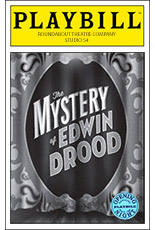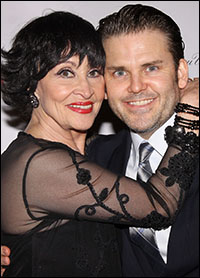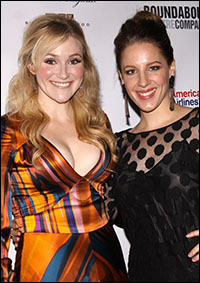
Like Sherlock Holmes, Rupert Holmes is Brit-born, but, unlike Sherlock, he creates mysteries rather than solves them — and the one he created (with songs!) out of Charles Dickens' famously unfinished — indeed, last — novel, The Mystery of Edwin Drood, gives "audience participation" a new meaning: We decide whoDroodit.
The Tony-winning Best Musical of 1986 that resulted from Holmes' Tony-winning book and score returned to Broadway Nov. 13 at Studio 54 — but not so you'd notice. That former den of iniquity and current Roundabout arena has been revamped with Victorian frills and finery into the Music Hall Royale of London, circa 1895.
The story and the setting are flavorful reflections of the real Holmes' formative early years in England when his love of Dickens and music halls began to take hold.
A postwar offspring of an American GI and an English lass, Holmes started with that and stayed that way after the big jump to the U.S. "My first three years of life were spent in England," he said. "I must have had a British accent for about four months after my family moved to Levittown, Long Island — and that'll destroy any British affectations. You don't have a hope at that point. My father was a master sergeant who had his own infantry-division band in World War II. Then, he became head of auditions at NBC radio and used to conduct Toscanini's orchestra in pop concerts."
That kind of musical inheritance doesn't exactly go begging here. The Mystery of Edwin Drood is not so much an attempt to fill in the massive blank caused by Dickens' abrupt death — enlisting the audience's help nightly to finger the culprit who killed his Edwin Drood — as it is an affectionate valentine to the Victorian stage and those earnest, if overripe, actors who trod the boards, their egos in ample view. The long corridor leading into the lobby and theatre of Studio 54 is lined with mock posters of the Music Hall Royale's coming atrocities or tombstones of its past:
Phillip Bax (Peter Benson) in Lancelot and Guinevere.
Alice Nutting, billed "the foremost male impersonator of her day" (Stephanie J. Block), in The Prince and the Pauper.
Janet Conover (Jessie Mueller), fanning herself feverishly, in Her Biggest Fan.
Clive Paget (a wickedly mustached Will Chase) in The Penitent Pirate.
Victor Grinstead (Andy Karl) in The Magic Lute.
Deirdre Peregrine (Betsy Wolfe) as Cinderella in Drop the Other Shoe.
Cedric Moncrieffe (Gregg Edelman) in She's Greek to Me.
Nick Cricker and Son (Robert Creighton and Nicholas Barasch) as Henry the Eighth (and Page) in Heads Will Roll!
As you might imagine, under Scott Ellis' direction, the 2012 cast has a field day playing their English cousins of 1895 playing Dickens' red herrings and reprobates.
And they don't waste any time. Gussied up in vintage duds by William Ivey Long, they're all over you on arrival, greeting you, hustling you down the corridor to your seat, brazenly soliciting votes for murderer-of-the-night (extending their roles). Even the ushers are dressed in period attire, and the bartenders wear stovepipe hats.
Holmes has even littered the play with relatives. "My mother's maiden name was Gwendolen Pynn, and she's one of the dancers in the opium den (Kiira Schmdit), so I got my mother in an opium den. My grandmother, Isabel Yearsley (Janine DiVita), is in the show, and the woman who cries 'Off to the Races' is my aunt, Florence Gill (Shannon Lewis). A lot of my family is in this show without them knowing it."
The idea of cross-dressing the ill-fated title character was not a flourish of Dickens but, again, an outgrowth of Holmes' English past. "When I was a boy," he recalled, "I went to see a Christmas panto, which is a special kind of Christmas play that's unique to England — a very populist play. One of the features of a British Christmas pageant is that the hero is always a female pop singer playing the part of a boy — say, Petula Clark as Aladdin. There's a lot of thigh-slapping and 'Hello, boys and girls' and talking to the audience and asking the audience to applaud, pretty much doing what Mary Martin did in Peter Pan. That production made a powerful impression on me when I was three years old, and, when I first started writing this, I realized that might be a wonderful twist to add to it — having Drood played by a young boy in that fashion. One, it was true to music-hall tradition, and, two, it would let me write a love duet for two sopranos. I thought it just made the whole show feel like it's from that world, and, also, it made the whole thing a little daffy. I liked that."

Buy this Limited Collector's Edition |
"I just love this show so much, and I love this cast even more. They're just delicious and fun. We trust each other, and, if something happens on stage, it just adds to the whole music-hall feel. If there's a mistake or somebody goes up, it works."
Costumer Long's supreme moment in this show — he always supplies at least one giddy, heady laugh — is the get-up he provided for her huffy diva exit from the stage. How do you accessorize a real bustle? With a real live dog — her own pup, a Maltese-Yorkshire terrier mix. "It's part wardrobe, part my vanity, and then all dog. The dress is heavy and huge, but, man, it's worth every pound. The audience really loves it."
George Rose's Tony-winning role of the Chairman who narrates and steers the story along (and, in a pinch, pinch-hits for a plastered actor) has been entrusted to the very able and very Irish Jim Norton, himself a Tony winner (for Seafarer).
"It's an absolute joy to do this play," he admitted. "I like the fact that it's like being on a tightrope without having a net. I'm not all that familiar with the world of musicals so each night I learn more. I've only done Finian's Rainbow, and I think, as a result of that, they decided, 'Yeah, he's up for this. We'll get him to play the Chairman.'" The part is primarily an acting role — and vintage acting, at that. "I've always been interested in the Victorian acting. I've listened to recordings, and, when I was very young, I went to see Emlyn Williams in a one-man show based on information about how Dickens did his show. I went back three nights in a row just to see this man perform so I've actually stolen a lot of that style for the part of the Chairman."
Chase's clean-cut all-Americanism has been successfully sabotaged by a thin sliver of a mustache, as befits the character that most authorities feel Dickens was singling out as the designated killer, the hop-head choir master, John Jasper, who has the hots for Edwin Drood's fiancée, Rosa Bud. "I dive in," Chase said of his new and sinister look. "My agent, manager and girlfriend hate it, but what're you going to do?
"I never saw the original stage production of Drood, which is why I wanted to do this piece. I wanted to be Howard McGillin when I grew up, and I wanted to have that voice. I owe most of my performance to Howard. Sonically, he's just brilliant."
He and Norton draw their loudest and longest applause for "Both Sides of the Coin," a number with an intense patter portion that might have been perfected after they were locked in a closet for six hours. It brings the house down, but it's no big deal, he contended. "The patter part of it was one of the easiest things to learn. Even my kids learned it by themselves. It's one of the most fun moments Jim and I have. It's been fun to have him around to talk about Victorian actors and music hall. He shed a lot of light on that. We've forgotten about Grand Gesture, and it's a lot of fun to get to do. You never get to do it. Everything is so naturalistic. It's fun to ham and get away with it."
| |
 |
|
| Chita Rivera and Robert Creighton | ||
| photo by Joseph Marzullo/WENN |
He was sporting two "mutton chops" on his face as well. "Because I'm a stage manager and not an actor in the show, they wanted me to look a little more real."
The last bow of the night went to the show's truest star in the smallish, but colorful, role of an opium den-mother, The Princess Puffer, originated by Cleo Laine. "Well, now I've done Cockney," sighed Chita Rivera, that one-woman U.N. who in shows past has played French, Greek, Puerto Rican, Italian, et al. How does she do it? "Ask Meryl Streep," she shrugged, professing no magic potion of her own.
In addition to crime-solving every night, the audience is asked to vote on a happy ending that will send one couple off into sunset, and on opening night Rivera drew the squat and scruffy Robert Creighton, who plays the hapless derelict, Durdles.
"We've been paired off before," she said, "but I tell you who I get a lot, who I adore — his son, the cutest thing you've ever seen." (This would be Nicholas Barasch, a 14-year-old redhead, previously seen on Broadway in a part Arthur Laurents created for the last West Side Story — "Kiddo," the boy soprano who sings "Somewhere.") Next for Rivera? "Dunno yet, but let's keep our fingers always crossed for The Visit."
Creighton, who covered for Joel Grey in Anything Goes recently, did what he called "a little homage to Joel — his makeup style. I'm wanted to look as drunk and decrepit as possible, hence the bad teeth and the whole thing." That look actually got him pulled out of the lineup. "I actually got picked as the murderer once. Rupert told me my confession was that song's debut on Broadway. But getting to be the lover who goes off with Chita was the real thing for me. Now, I can die and go to heaven."
| |
 |
|
| Betsy Wolfe and Jessie Mueller | ||
| Photo by Joseph Marzullo/WENN |
Significant Others of cast members — Debra Messing of "Smash," Marc Kudisch, Orfeh and Sebastian Arcelus — formed the family cheering section. Making it a double-dip Debra night: Debra Monk, in support of her fave director, Ellis. She is about to land big on Broadway as Big Mama in the new Cat on a Hot Tin Roof, and she couldn't be happier that the show that brought her to New York, Pump Boys and Dinettes, is likewise Broadway-bound, conducted or directed by John Doyle.
Neil Simon (the playwright) arrived with his Sugar, Elaine Joyce, and both lit up at the slight of Linda Lavin and her hubby, Steve Bakunas. Lavin can't jump into the Hal Prince musical Prince of Broadway quick enough. Also in attendance: The Lunts of late (Byron Jennings and Carolyn McCormick from Ten Chimneys), Stephen Schwartz, Tony winner Julie White, Birdland emcee Jim Caruso and John Weidman.
Jamie deRoy, the comedienne-producer fated to be feted Nov. 14 along with Tyne Daly and Ted Snowden at Primary Stages' Edison Ballroom gala, arrived on the arm of cabaret kingpin Barry Kleinbort, who has two one-person shows about to lift off: Call Me Papo with Man of La Mancha's Hechter Ubarry Nov. 17 and Nov. 30 at the Laurie Beechman, and Jeffrey Hatcher's Thirteen Things About Ed Carpolotti with Penny Fuller and Paul Greenwood at the piano Dec. 4-30 at Primary Stages.
Polly Bergen was looking forward to The Paley Center showing of her Emmy-winning Helen Morgan on Nov 17. Rex Reed, her long-time friend and Connecticut neighbor, will quiz her about that classic 1957 "Playhouse 90" production.

















































































